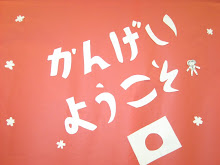Monday, November 23, 2009 An Eight Period Day
JAPANESE 3 -- First period
先生(せんせい)の家から どうやって レストランに 行けますか。
私 (わたし)は 家(うち) を 出て(でて) Washtenaw Ave. を まっすぐ 行きます。
二つ目(みっつめ) の かど を 左 に まがります。
その 道 (みち) は Belmont Ave. です。
まっすぐ 行きます。しんごう まで あるいて 行きます。
その みち は Western Ave. です。
三つ目 の こうさてん を わたります。
それから レストラン は 右 に あります。
Collected homework from text page 37 on descriptions of locations on the map of Hirosaki.
Homework Assignment:
Write directions for going from your house to some destination you often visit in your neighborhood (approximately 8 sentences). Tomorrow, hand it in along with a map of the route. [See the model above. Each individual’s directions will necessarily be different since you all live in different places and are going to different destinations.]
REMINDER:
Sentence-ending conjugations for い adjectives:
――い です、――よくない です、――かった です、 ――くなかった です。
Sentence ending conjugations for な adjectives :
――です、――じゃない です {Or で は ありません}、――でした、 ――じゃなかった です {Or で は ありませんでした}
{Explanation for talking about kanji:
{Kanji compound example –人口
{えい語 で いみ は Population という こと です。
{かんじ は 「ひと」 の じん と くち の 「こう」 です。}
JAPANESE 1 – Fifth period
Collect adjective posters and have everyone read them out loud.
Iroha posters are due Monday
View BBC-produced “Japanese Language and People” video series, #1
Students take notes.
Don’t forget kanji:
日、月、木、本
本 As “tree” plus mark indicating root or origin
Japan as “sun’s source” – 日本
にほん 日本
にほんご 日本語
Study!
.
JAPANESE 2 -- Sixth period
Handouts practicing with い and な adjective tenses
I. First handout
A. Read the following conversation. Put い, な, or の, in each blank, where necessary. If nothing is necessary, write an X.
1. 森 (もり); その はな は きれい ____ です ね.
2. 林 (はやし); そう です か. さくら ____ はな です か.
3. 森; いいえ, うめ (plum) ____ はな です.
4. 林; しろい ____ はな が すき です か.
5. 森; はい, すき です. でも ピンク ____ はな も すき です.
6. 林; わたし は あかい ____ はな が だいすき です.
7. 森; ほんとう? この あかい ____ はな ____ なまえ は なん です か.
8. 林; なまえ は ばら (rose) です. そして ゆうめい ____ です.
9. 林; なつやすみ に わたし は シカゴ ボタニック にわ で
ハンサム _____ ばら を みました.
B. Translate sentences 5 through 9 into English.
II. Second handout
Write the correct tense of the adjective in the following sentences:
去年(きょねnLast year)の 感謝祭(かんしゃさい)の 日 に わたし と かぞく と そぼ の うち でーーーー
そふ は (Was handsome)___
ゴジラ は (Was not cute)____
おてあらい は (Was narrow/small)____
クランベリ は (Were not big)____
Hello Kitty は (Was she pretty?)____
トロンペット は (Was not quiet)____
サンタ は (Was an old guy/person)_____
七面鳥(しちめんちょう)は (Was strange)____
くり(Chestnuts)は(Were yucky-tasting)__
わたし は ポテト が (Liked)_____
スタフィング は (Was delicious)____
Quiz on adjective vocab and forms postponed to Tuesday.
Postpone viewing BBC-produced “Japanese Language and People” video series #4, until Tuesday.
Samurai culture and historical origins militarism in Japan
Remember these kanji:
目 め Eye
耳 みみ Ear
大きい Big おおきい
手 て Hand
口 くち Mouth
足 あし Feet/legs
Reminder: We all must be polite in the Japanese language classroom. Not only is it important in our lives in general – it is an essential part of Japanese culture. ください、おねがい します、ありがとう、すみません Are the most important words and phrases in Japanese.
JAPANESE 4 and AP – Seventh period
Went over AP writing practice from last week – read out loud and talk about structure, errors, tense consistency.
Oral and aural review of giving and receiving:
上げる くれる もらう
さしあげる 下さる いただく
Homework:
日本との出会い:第三課
Page 44:
I A and
II
Continue to listen to JapanesePod 101
Upper intermediate S3 (23)
Duty and human feeling
義理(ぎり) と 人情(にんじょう)
About Me

- O.Kimeru
- M.A. 1992 from U. of Chicago; Japan Foundation Fellow in 1987-88; research fellow Yokohama City University; Japanese language teacher since 1991; also taught French (member American Association of Teachers of French), English as a Second Language (to students), methodology of teaching ESL (to Japanese high school teachers), English, Japanese history/culture, drama; in 2002 and 2004, listed in Who's Who Among America's Teachers; member of Chicago Sister Cities Osaka Committee, and chair of its Education Sub-Committee; vice-president Illinois Association of Teachers of Japanese; Payton H.S. World Language Department Chair from 2003-2007, under founding principal Mrs. Gail Ward; taught Japanese and coordinated Japan Exchange at Payton from 2003 to 2010; Japanese teacher at Burr Public School beginning August, 2010
Followers
Blog Archive
-
▼
2009
(146)
-
▼
November
(15)
- November 30, 2009 An Eight Period Day
- Novembeer 24, 2009 An Eight Period Day
- November 23, 2009 An Eight Period Day
- November 20, 2009 An Eight Period Day
- November 18, 2009 A Block Two Day
- November Newsletter for Japanese language program
- November 17, 2009 A Block One Day
- November 16, 2009 An Eight Period Day
- November 13, 2009 An Eight P...
- November 12, 2009 A Block Two Day
- November 10, 2009 A Block One Day
- November 5, 2009 An Eight Period Day
- November 4, 2009 A Block Two Day
- November 3, 2009 A Block One Day
- November 2, 2009 An Eight Period Day
-
▼
November
(15)